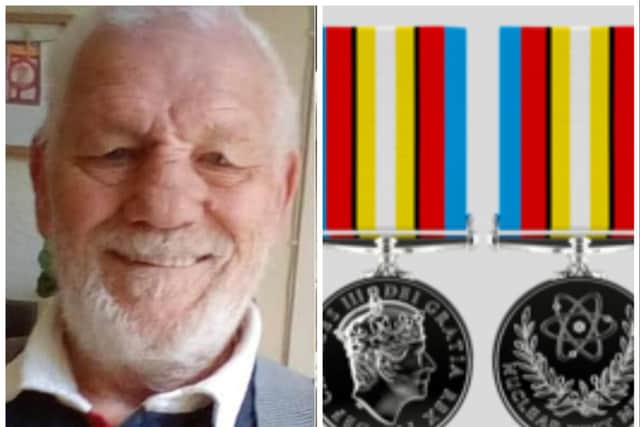Doncaster nuclear test veteran in line for long awaited medal after 60 year battle
and live on Freeview channel 276
RAF veteran Gordon Coggon was among a number of British military personnel involved in a programme of nuclear explosions on remote Christmas Island in the late 1950s.
The Government has announced the design of the Nuclear Test Medal which will recognise military, civilian, and overseas staff and personnel who participated in Britain’s nuclear testing programme in the 1950s and 1960s, with Mr Coggon set be among the recipients.
Advertisement
Hide AdAdvertisement
Hide AdProduction will begin shortly so veterans can receive them before Remembrance Sunday.


The medal was announced by the Prime Minister in November, 70 years after the first British test of a nuclear weapon.
Since the announcement, the Government has worked hard to ensure that a fitting medal was designed, minted and issued to as many veterans as possible in time for this year’s Remembrance events.
The medal will now go into production by Worcestershire Medal Services, with the first veterans set to receive their medal ahead of Remembrance Sunday this year.
Advertisement
Hide AdAdvertisement
Hide AdMinister for Veterans’ Affairs, Johnny Mercer MP, said: As thousands flock to the cinemas to watch Oppenheimer, it’s important to remember the contributions of the veterans, scientists and staff who worked on Britain’s nuclear programme.
“Our nuclear deterrent continues to underpin both our security and the security of our NATO allies and this new medal is a fitting tribute to all those who worked to develop this vital defence.”
The medal will recognise the contribution made by veterans and civilian staff from across Australia, New Zealand, Fiji and Kiribati and includes scientists and local employees.
The design features an atom surrounded by olive branches and bears the words “Nuclear Test Medal”. The obverse will bear an effigy of His Majesty the King. The simplicity of the design was chosen to reflect the multitude of different roles that were carried out by the broad range of recipients.
Advertisement
Hide AdAdvertisement
Hide AdThe ribbon design includes white, yellow, black and red, with the lighter blue for the sky and ocean, representative of the Pacific.
The medal will also be awarded posthumously. Veterans, civilian staff and next of kin from across the UK and Commonwealth can apply for the commemorative medal through the MOD’s Medal Office, which will be free of charge.
Mr Coggon, who was exposed to massive doses of radiation in the bomb tests has long called on the Government to apologise for using personnel as ‘lab rats’ and ‘guinea pigs.’
He was involved in the tests which were part of a British Government programme to develop devastating hydrogen bombs in the aftermath of the Second World War.
Advertisement
Hide AdAdvertisement
Hide AdBut personnel were blasted with huge doses of radiation during the tests, with many developing cancer and dying early as a result of the testing programme. Mr Coggon himself spent time washing radiation off planes used in the testing.
Mr Coggon, 84, of Cantley, said: “For almost 65 years, we nuclear test veterans have been lobbying the British Government for some kind of recognition for our service to the crown and country.
"We were used in these tests and have been subjected to irradiation which is now being passed genetically to our children.
He added: “We are the forgotten army, the nuclear test veterans of the fifties and sixties who were made to put ourselves and our families at risk, by being used in experiments as guinea pigs, by the United Kingdom's race to arm themselves with the hydrogen bomb.”
Advertisement
Hide AdAdvertisement
Hide AdDubbed Operation Grapple, the top secret programme was a set of British nuclear weapons tests of early atomic bombs and hydrogen bombs carried out in 1957 and 1958 at Malden Island and Christmas Island in the Pacific Ocean.
Nine nuclear explosions were initiated during the programme.
Mr Coggon says he and other veterans were exposed to radiation emitting plutonium with a half-life of 24,000 years.
Mr Coggon has also recently published a book about his time on Christmas Island, entitled The Life of A Yorkshire Lad, which is available via Amazon.